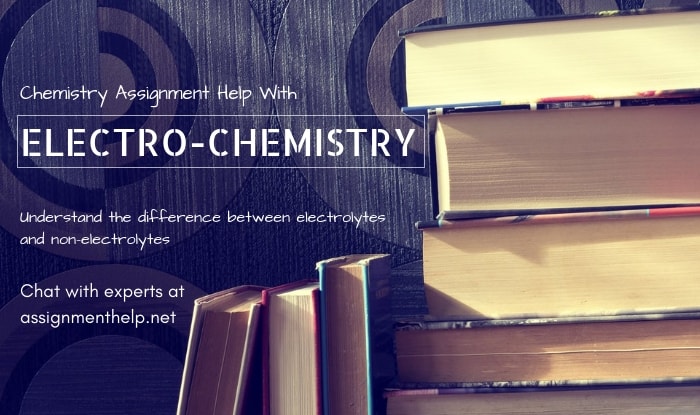Chemistry Assignment Help With Electro Chemistry

9.1 Electrolytes
Electrolyte may be defined as that substance which in the form of its solution or in its fused state conducts electricity and simultaneously undergoes chemical decomposition. On the contrary, substances which in the form of their solutions or in their molten (fused) state do not conduct electricity are called non-electrolytes., e.g. all organic compounds and pure water.
Electro Chemistry Introduction
Electrochemistry is a branch of chemistry that deals with the study of the relationship between electricity and chemical reactions. It explores how chemical reactions can be driven or influenced by the flow of electrons. Electrochemical processes are crucial in various fields, including chemistry, biology, physics, and industry, and they play a significant role in our everyday lives. Here are some key concepts and components of electrochemistry:
-
Electrochemical Cell: This is the basic setup used in electrochemistry to carry out redox (reduction-oxidation) reactions. It consists of two electrodes (anode and cathode) immersed in an electrolyte solution. Electrochemical cells can be categorized into galvanic cells (which produce electricity from spontaneous chemical reactions) and electrolytic cells (which use electricity to drive non-spontaneous reactions).
-
Electrodes: These are conductive materials (often metals or graphite) that serve as the sites of electron transfer in an electrochemical cell. The anode is where oxidation occurs (electrons are lost), while the cathode is where reduction occurs (electrons are gained).
-
Electrolyte: The electrolyte is an ionic solution that allows ions to move between the two electrodes, completing the electrical circuit and maintaining charge neutrality. It also facilitates the flow of ions involved in the redox reactions.
-
Redox Reactions: Electrochemical reactions involve the transfer of electrons between chemical species. One species undergoes oxidation (loses electrons), while another undergoes reduction (gains electrons). The overall process is known as a redox (reduction-oxidation) reaction.
-
Electromotive Force (EMF): EMF, often measured in volts, is the driving force or voltage generated by an electrochemical cell. It represents the tendency of electrons to flow from the anode to the cathode through an external circuit.
-
Nernst Equation: This equation relates the EMF of an electrochemical cell to the concentrations of reactants and products involved in the redox reaction. It is particularly useful for understanding how changing concentrations affect cell potential.
-
Faraday's Laws of Electrolysis: These laws describe the relationship between the amount of substance produced or consumed during an electrolytic process and the amount of electricity (in coulombs) passing through the cell.
-
Applications: Electrochemistry has numerous practical applications, including in batteries, fuel cells, corrosion prevention, electroplating, sensors, and the study of biological processes like cellular respiration and nerve impulses.
-
Electrochemical Series: This is a list of metals and other substances arranged in order of their standard reduction potentials. It helps predict the direction of spontaneous redox reactions.
-
Electrolysis: Electrolysis is the process of using electrical energy to drive a non-spontaneous chemical reaction. It is commonly used for metal plating, water splitting, and the production of certain chemicals.
-
Electrochemical Sensors: These devices use the electrochemical principles to detect and measure the concentration of specific substances, such as glucose in blood glucose monitors or toxic gases in environmental monitoring.
Electrochemistry is a broad and diverse field with applications ranging from fundamental scientific research to practical technological advancements. It plays a crucial role in sustainable energy solutions, materials science, and environmental protection.
Email Based Assignment Help in Electro Chemistry
We are the leading online Assignment Help provider. Find answers to all of your doubts regarding Electrolytes in chemistry. We at assignmenthelp.net provide homework, Assignment Help to the school, college or university level students. Our expert online tutors are available to help you with Electrolytes. Our service is focused on: time delivery, superior quality, creativity and originality.

To submit Electro Chemistry Course click here.
Following are some of the topics in Electro Chemistry in which we provide help:
- Qualitative Aspects of Electrolysis
- Laws of Electrolysis
- Types of Electrodes
- Electrode Potential
- Cell Potentials (EMF) from Electrode Potentials
- Cell Potential (EMF) and Gibbs free energy
- Measurement of Entropy and Enthalpy Changes from EMF Data
- Relation between equivalent conductivity and molar conductivity


